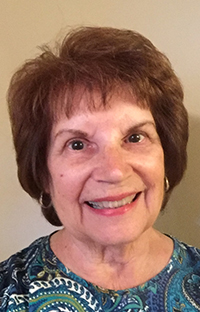Search Our Blog Posts
Blog Article Tags
We love building relationships. Subscribe to our blog to receive weekly encouragement in your email inbox.
- Details
 Written by Deanna Brooks, volunteer with Iron Rose Sister Ministries in Arkansas
Written by Deanna Brooks, volunteer with Iron Rose Sister Ministries in Arkansas
In 2 Timothy 4:7 Paul writes: “I have fought the good fight, I have finished the race, I have kept the faith.”
Think on those words, then look at verse 8 where he follows those thoughts by saying, “Henceforth there is laid up for me the crown of righteousness, which the Lord, the righteous judge, will award to me on that day, and not only to me but also to all who have loved his appearing.”
What do we know about Paul? Why was he able to write with such confidence?
We first meet Paul in Acts 7:58 where he is called by his Jewish name Saul, holding the garments of those stoning Stephen, then Acts 8:1 tells us Saul approved the execution. This makes us think he already had some authority among Jewish leaders.
Paul tells a little about himself in 1 Corinthians 15:9, 10: “For I am the least of the apostles, unworthy to be called an apostle, because I persecuted the church of God. But by the grace of God I am what I am, and his grace toward me was not in vain…”
We learn more in Philippians 3:5,6: “circumcised on the eighth day, of the people of Israel, of the tribe of Benjamin, a Hebrew of Hebrews; as to the law, a Pharisee; as to zeal, a persecutor of the church; as to righteousness under the law, blameless.”
Paul was born a Jew, and his parents followed Jewish law and circumcised him when he was eight days old, according to the law God gave Abraham in Genesis 17:12.
Paul was a Pharisee, a teacher of the law, and he was zealous to fight against anything that challenged the purity of Israel or of the law.
He was a persecutor of the church and willing to use violence to protect the law of Moses. He believed the early Christians were blasphemers against a holy God. Paul would have remembered Leviticus 24:10-16 where God was blasphemed and knew this was a serious offense. He lived blamelessly according to how he understood the law to be.
As a faithful Jew he offered the appropriate sacrifices and kept the feast days and purity laws, and he would have expected others to do the same.
Paul grew up in Jerusalem and studied at the school of Gamaliel (a leading authority in the Sanhedrin) according to Acts 22:3. Because of his schooling, we assume he was from a wealthy family. His birthplace, Tarsus, about 620 miles from Jerusalem, dated back to 1900 BC, and was an important trade city in what we know as modern-day Turkey.
Paul had access to power, to money, and to the prestige of high social standing… all of which he gave up to follow Jesus.
In Philippians 3:7-8 Paul writes: “But whatever gain I had, I counted as loss for the sake of Christ. Indeed, I count everything as loss because of the surpassing worth of knowing Christ Jesus my Lord. For his sake I have suffered the loss of all things and count them as rubbish, in order that I may gain Christ.”
Paul had given up everything from his early life in order to be a disciple of the Christ.
Because Paul went to the Gentiles, he did not speak of “virtue” since they would have thought of the four Greek virtues: justice, courage, temperance, and prudence. Instead, Paul spoke of the fruit of the Spirit in Galatians 5:22-23: love, joy, peace, patience, kindness, goodness, faithfulness, gentleness, self-control…and he encouraged Christians to build these into their lives.
Paul tells us his goal in Philippians 3:10: “that I may know him and the power of his resurrection, and may share his sufferings, becoming like him in his death.”
He encourages us to forget what’s behind and press on remembering the goal that’s in front of us (Phil. 3:14-15.)
Paul tells the Sanhedrin in Acts 23:1: “Brothers, I have lived my life before God in all good conscience up to this day.” Because he had done what he thought God wanted him to do, when Jesus got his attention on the road to Damascus, Paul was receptive to the message of Jesus.
Before Paul began persecuting Christians, it is probable that he studied this new faith because of wanting to do what was right, so he may have already known something about what the disciples did and believed.
The apostle Paul, born a citizen of Rome, reminds us that our citizenship is in heaven and we await a Savior who will transform us (Phil. 3:20-21; 4:1), so “stand firm in the LORD.”
In standing firm, we, too, can say with Paul, “I have kept the faith…a crown of righteousness is waiting.”
Quotations are ESV.
#IronRoseSister #HIStories #Paul #runtherace #keepthefaith #standfirm #crownofrighteousness #guestwriter #blog
- Details
 Written by Ann Thiede, volunteer with Iron Rose Sister Ministries in Arkansas
Written by Ann Thiede, volunteer with Iron Rose Sister Ministries in Arkansas
I’ve been on a prayer journey for fifty years, from my nineteenth year when embracing Jesus as Lord and Savior until the present. What a glorious journey it has been from a heartfelt wobbly prayer spoken out loud to the God of the universe! I’m so glad to share with you some highlights with the hope that your own journey will be empowered.
All good relationships involve talking and listening. Early in this journey I began learning the truth of Hebrews 4:12 (NIV): “For the Word of God is alive and active. Sharper than any double-edged sword, it penetrates even to dividing soul and spirit, joints and marrow: it judges the thoughts and attitudes of the heart.” God would speak at times to tear down sin in my heart and mind, but also highlight reminders of His unfailing love: “The Lord has appeared of old to me, saying: ‘Yes, I have loved you with an everlasting love; therefore with lovingkindness I have drawn you. Again I will build you, and you shall be rebuilt, O virgin of Israel!’” (Jer. 31:3,4 NKJV). I found the power of confession and forgiveness, walking beside King David as he, too, faced the sin he had committed, and I prayed what he penned: “Create in me a clean heart, O God, and renew a right spirit within me” (Ps. 51:10 ESV).
Prayer became very personal in difficult times. I’ve loved David’s sentiments in Psalm 23 and learned to pray it first person:
“Lord, You are my Shepherd; I lack nothing. You make me lie down in green pastures; You lead me beside quiet waters; You refresh my soul. You guide me along the right paths for Your name’s sake. Even though I walk through the darkest valley, I will fear no evil, for You are with me. Your rod and Your staff they comfort me…” (taken from Psalm 23 NIV)
Beyond personal needs, joining our church’s prayer chain as a young mother increased my desire to pray for others. I learned the needs of some I had never met and the value of lifting them up to the Father. Often some would be on the list day after day, week after week, teaching perseverance. Many supplications involved medical/health issues. As I developed closer relationships, prayers were needed for the soul and spirit as well. To counter discouragement or despair, I learned to share Paul’s words: “I pray that the eyes of your heart may be enlightened in order that you may know the hope to which He has called you, the riches of His glorious inheritance in His holy people, and His incomparably great power for us who believe” (Eph. 1:18, 19 NIV).
About ten years ago while traveling with my husband, I began a written list in the iPhone Notes app labeled ‘Prayers.’ The phone was an easy tool as it allowed an immediate way to record people in need. And my memory can be terrible! I did not want to say I’d pray and then forget. The list ballooned and became downright unmanageable. I struggled lifting everyone up daily. So, the thought came to categorize. I bought a lined journal for weekly prayers. Monday became ‘Missions’ to lift up those serving locally and abroad. Tuesday included ‘Cancer and Serious Illness’ and Wednesday, ‘Addictions.’ I won’t share the rest. If you decide to embark on something similar, it will be your Spirit-led categories. I keep the daily categories for a month and then update, making new pages. And I’ve found great joy leaving room at the bottom of each page for praise and thanksgiving when God answers!
Along with better organizing, God has led me on a journey of greater belief. Would I take Jesus seriously when He spoke such words as “Everything is possible for one who believes!” in Mark 9:23 (NIV) and the beautiful discourse about asking, seeking, knocking and the promise of God giving, the seeker finding, and doors opening (Matt. 7:7-8)? How could I not! These promises became foundational in my prayer life, believing my Father not only heard, but would answer according to His glorious and good will. He has given me solace for those battling with advanced, relentless cancer as supplications continued for comfort, peace and healing, knowing that His perfect plan could mean healing in the next life.
A few final thoughts: If possible, correspond with people for whom you pray, or sometimes their loved ones, to find out pertinent needs using texts, phone calls, Facebook posts and Messenger. People are blessed when they know you lift them up consistently. Pray specifically, not general prayers. And I prefer a private place to pray out loud, though praying at anytime, anywhere, is our calling. In fact, we’re told to ‘pray continually’ (1 Thes. 5:17 NIV). As we encounter needs, pray. As we see someone’s hurt or pain, reach out and pray, right then and there. As we see beauty in all varieties, pray with praise. Instead of worrying, pray and praise (Phil. 4: 6).
As you’ve read, what is one thing you will put into practice to strengthen your personal prayer life?
#IronRoseSister #HIStories #intercession #prayer #prayspecifically #praycontinually #prayconsistently #prayforothers #guestwriter #blog